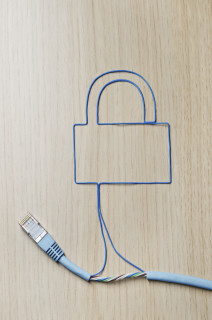June 27, 2016 | Wind Resource Assessment

Data matters. The accuracy, consistency, and yes, safety of measurement data keep many wind developers and analysts up at night. Customers often ask about the digital and physical security of RNRG instruments, so I sat down with Michael Fisher, product manager for our wind resource assessment (WRA) line, to get answers to the most common questions.
Q: Why is data security important?
Michael: Wind projects are built on the measurement data that are collected in the WRA stage, so the importance can’t be understated. Data can mean the difference between a project’s success and total failure. The global wind industry is very competitive, and wind measurement data are a key part of developers’ competitive advantage. They invest a lot of money in securing land and collecting measurements. Physical security concerns vary by region, but the sensitivity of data is a global concern.
Q: When designing data security features for SymphoniePRO, what goals did RNRG have?
Michael: Fundamentally, we had two objectives: preventing unwanted access to physical data loggers in the field and protecting measurement data once it’s collected via its electronic path to users. We focused on balancing simplicity, ease-of-use, and ease-of-access for authorized users with sufficient security measures to prevent unwanted access.
Q: Are certain regions/countries more prone to theft than others?
Michael: Yes, certain areas are more prone. India is one that we’ve seen. In China, users mount data loggers 10 or more meters up the tower (out of reach) and install anti-climb mechanisms on lattice towers. The same is true in Mexico and Brazil. It’s pretty standard practice to lock shelter boxes anywhere in the world. On more than one occasion, we have actually seen people hire full-time armed guards to protect their measurement assets, which illustrates how far some need to go to protect their measurement data.
Vandalism can also be an issue. We’ve heard of people cutting towers down or using anemometers as target practice. Wildlife can also damage equipment (and themselves) if proper precautions are not taken. Industrial espionage also happens, with competitors stealing data storage devices.
Q: What security features does SymphoniePRO offer?
Michael: We designed redundant data storage with internal FLASH memory and an external SD card to help prevent data loss. There’s a six-digit PIN that can be programmed into the logger to prevent unauthorized access to the logger itself, either directly via the keypad or remotely via the software. The logger also maintains an event log that records and timestamps access events.
There’s a separate data encryption password which, when activated, encrypts all data stored on the logger, rendering it useless to anyone without the password. During the transmission of data, SymphoniePRO’s MetLink protocol includes an authentication step as part of the communications process to verify that both the hardware and software are authentic RNRG OEM products.
Q: Can I get an alert if the card is pulled (i.e. theft)?
Michael: Currently, this feature is not available, but it is one that we are looking into. If your area is prone to theft, we recommend the following best practices for security:
- Mount your data logger out of reach.
- Use encryption so that a stolen SD doesn’t give thieves something usable.
- Keep in mind that the data are also stored internally in FLASH memory, so you will not lose the data. If your project is in an area that is prone to theft, you also have the option to not install an SD card in the first place.
Q: What happens if the data logger loses power (i.e. if the PV panel is stolen)?
Michael: If the PV panel is stolen, the power supply system is designed to maintain critical functionality as long as possible. In other words, communications will cease before the data logging functionality. The system will run off of the iPack batteries during this time, and after those are drained, the D cell batteries in the data logger will continue to power low energy-consuming sensors as long as possible. The duration of data logging sans PV panel depends heavily on the particulars of the site, such as sensor configuration. This scenario underscores the importance of routine data collection and quality control processes in order to maintain system availability.
Q: Do you do SMS texting? What alternatives are available?
Michael: We don’t offer SMS texting at this time. The SymphoniePRO system collects more meta information (e.g. diagnostic data) than previous generation data loggers and provides us with a foundation for more advanced alerting functionality. Please let us know if you’re interested in this type of feature so we can consider your feedback as we continue to evolve the product.
To learn more about the SymphoniePRO Data Logger, visit the product page.
